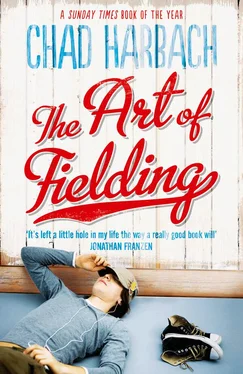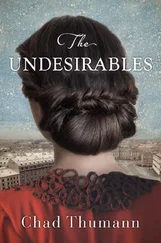Aparicio played shortstop for the St. Louis Cardinals for eighteen seasons. He retired the year Henry turned ten. He was a first-ballot Hall of Famer and the greatest defensive shortstop who ever lived. As a ballplayer, Henry had modeled himself after his hero in every particular, from the gliding, two-handed way he fielded grounders, to the way he wore his cap pulled low to shield his eyes, to the three taps he gave his heart before stepping into the batter’s box. And of course the jersey number. Aparicio believed that the number 3 had deep significance.
3. There are three stages: Thoughtless being. Thought. Return to thoughtless being.
33. Do not confuse the first and third stages. Thoughtless being is attained by everyone, the return to thoughtless being by a very few.
There were, admittedly, many sentences and statements in The Art that Henry did not yet understand. The opaque parts of The Art, though, had always been his favorites, even more than the detailed and extremely helpful descriptions of, say, how to keep a runner close to second base (flirtation, Aparicio called it) or what sort of cleats to wear on wet grass. The opaque parts, frustrating as they could be, gave Henry something to aspire to. Someday, he dreamed, he would be enough of a ballplayer to crack them open and suck out their hidden wisdom.
213. Death is the sanction of all that the athlete does.
The bleepy, bloopy music lulled. Henry became aware of a murmurous sound that seemed to be coming from behind a closed door in the corner of the room. He’d thought it was a closet, but now he pressed his ear to it and heard a rush of running water. He knocked softly.
No response. He twisted the knob, and a sharp yelp rang out as the door struck something solid. Henry jerked the door shut. But that was a foolish thing to do — it wasn’t as if he could run away. He opened the door again, and again it cracked against something solid.
“Ow!” came a cry from inside. “Please stop!”
The room turned out to be a bathroom, and a person about Henry’s age was lying on the black-and-white checkerboard tile, clutching the top of his head. His ashen hair was cropped close, and between the fingers of his canary-yellow rubber gloves Henry could see a cut edged with blood. Water ran in the tub, and a toothbrush lay at his side, frothing with grainy, aqua-flecked cleanser. “Are you okay?” Henry asked.
“This grout is filthy.” The young man sat up, rubbed his head. “You’d think they would clean the grout.” His skin was the color of weak coffee. He put on a pair of wire-rimmed glasses and surveyed Henry from head to toe. “Who are you?”
“I’m Henry,” Henry said.
“Really?” The young man’s lunular eyebrows lifted. “Are you sure?”
Henry looked down at the palm of his right hand, as if that might be the place to find some irrefutable sign of Henryness. “Pretty sure.”
The young man rose to his feet and, after peeling off one of his bright-yellow gloves, pumped Henry’s hand warmly. “I was expecting someone larger,” he explained. “Because of the baseball factor. My name’s Owen Dunne. I’ll be your gay mulatto roommate.”
Henry nodded in a way he hoped was appropriate.
“I was supposed to have this room to myself.” Owen swept one hand before him, as if spanning a broad vista. “It was part of my scholarship package, as the winner of the Maria Westish Award. I’ve always dreamed of living alone. Haven’t you?”
Henry, actually, had always dreamed of living with someone who owned a copy of Aparicio’s book. “Do you play baseball?” he asked, turning Owen’s hardback Art in his hands.
“I’ve dabbled in the game,” Owen said, and added somewhat mysteriously, “But not like you.”
“What do you mean?”
“Last week I received a call from President Affenlight. Are you familiar with his Sperm-Squeezers?”
Henry was not. Owen nodded sympathetically. “Not surprising,” he said. “It doesn’t have much academic traction these days, though it was a seminal — ha! — work in its field. It was a great inspiration to me when I was fourteen, fifteen years old. Anyway, President Affenlight phoned me at my mother’s house in San Jose and said that a student of considerable talents had been added to the freshperson class, and that though this was excellent news for the college as a whole, it posed a dilemma for the Housing office. Since I was the only member of the class with a single room, he wondered if I might be willing to forgo one of my scholarship’s privileges and take on a roommate.
“Affenlight’s a smooth talker,” Owen continued. “He spoke so highly of you, and of the more abstract virtues of roommatehood, that I almost forgot to negotiate. Frankly, I find the professionalization of collegiate sport to be a rather despicable phenomenon. But if the administration was willing to buy me that” — he pointed a yellow-gloved finger at the sleek computer that sat atop his desk — “and to throw in a handsome book allowance just to persuade me to live with you, then you must be quite a ballplayer. I’d be honored to throw the ball around sometime.”
“They’re giving you money to be my roommate?” Henry asked, so incredulous and confused that he barely registered Owen’s offer. What could Mike Schwartz have possibly said or done to produce a situation in which the president of Westish called people on the phone and spoke highly of him? “Would it be rude . . . I mean . . . do you mind if I ask . . . ?”
Owen shrugged. “Probably nowhere near what they’re paying you. But enough to buy that rug out there, which is an expensive rug, so please do not put your shoes on it. And enough to keep me in high-quality marijuana for the year. Well, maybe for the semester. Till Halloween, at least.”
After that first encounter, Henry scarcely saw Owen. Most afternoons Owen would sweep into the room, remove certain notebooks from his satchel and replace them with certain other notebooks, or remove his handsome gray sweater and replace it with his handsome red sweater, and then sweep back out again with a word: “Rehearsal.” “Protest.” “Date.” Henry would nod and, for however many seconds Owen was in the room, devote himself deeply to whatever assignment lay open in front of him, so as not to seem entirely useless and adrift.
The date was with Jason Gomes, a senior who starred in all of the campus plays. Before long Owen’s notebooks and sweaters had migrated to Jason’s room. In the mornings, as Henry walked to class, he would see them reading together at the campus coffee shop, Café Oo, Jason’s hand laid atop Owen’s as they lingered over their espresso and their books, some of whose titles were French. At dinnertime, as Henry sat alone in a dim alcove of the dining hall, trying to look both inconspicuous and content, Owen and Jason would wander in, gather fruit and crackers to sustain them through rehearsals, and wander back out again. After midnight, as Henry drew the shades to go to sleep, he would see them sharing a joint on the opposite stoop, Owen’s head tipped sideways to rest on his lover’s shoulder. They didn’t need to bother with food or sleep, or so it seemed to Henry: they were too busy, too happy, for such trivial concerns. Owen had written a three-act play, “a kind of neo-Marxian Macbeth set in an open-plan office,” as he once described it, and Jason was playing the lead.
On a couple of weekends that fall, Jason drove home to Chicago or some suburb thereof. For Henry these weekends were a source of relief and joy. He had a friend, at least till Sunday night. Owen would spend the morning reading and drinking tea in his plaid pajamas, sometimes smoking a joint or staring idly at the face of his silent BlackBerry, until Henry, with careful nonchalance, asked whether he might like to go get brunch. Owen would look up over his round-rimmed glasses and sigh, as if Henry were an annoying child. But as soon as they got outside in the autumn air, Owen — usually still in his pajamas, with a sweater over the top — would begin to talk, answering questions Henry would never think to ask.
Читать дальше










